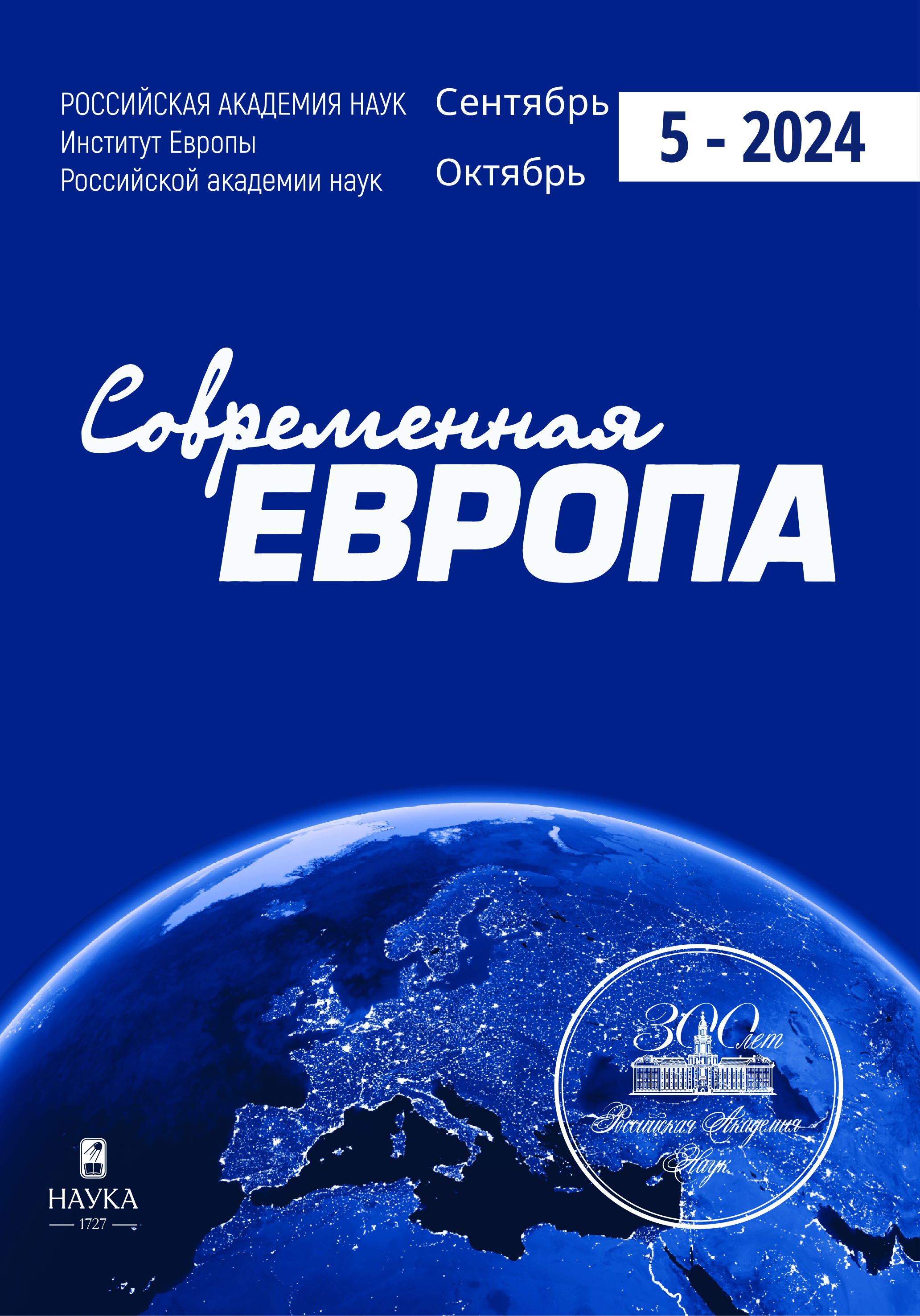In Search of a New Strategy of the Franco-German Tandem: Period of Limited Capacity
- Authors: Rubinskiy Y.I1, Sindeev A.A1
-
Affiliations:
- Institute of Europe, RAS
- Issue: No 5 (126) (2024)
- Pages: 36-48
- Section: EUROPEAN PROCESS: COUNTRIES AND REGIONS
- URL: https://ruspoj.com/0201-7083/article/view/652313
- DOI: https://doi.org/10.31857/S0201708324050036
- ID: 652313
Cite item
Abstract
The authors analyse the beginning of a period of limited capacity of France and Ger-many to act and the reasons for this. They present the main features of this period. The two countries are searching for a new, joint and more in-depth strategy for the future of the tandem. This strategy will include a reform agenda for the European Union and will be based on a possible convergence of socio-economic models. The first part of the article «Macron’s autonomous initiatives and the Meseberg compromise» provides examples where President France hindered the tandem’s search for a common strategy. Documents signed by the two governments in the areas of security, defence and competitiveness of the EU during Macron's state visit to Germany are also analysed. The authors conclude that the partners allow a differentiation between their tasks in NATO and the Common Defence and Security Policy. In the second section «The elections to the European Parliament and the dissolution of the National Assembly» the results are compared and their impact on the beginning of the period of limited capacity for action of France and Ger-many is demonstrated. In the third section «The elections to the National Assembly and their consequences» the authors draw attention to little-known facts and connections, including the help of some German parties in the formation of the democratic coalition in France. In the fourth section «Signs of the period of limited capacity for action» seven signs are described. The authors believe that these signs mean that France and Germany should be deeply interested in normalising relations with Russia. They also reflect on how partners intend to overcome asymmetry and objective differences.
Keywords
About the authors
Yu. I Rubinskiy
Institute of Europe, RAS
Email: yuri.rubinski@mail.ru
Doctor of Sciences (History), Professor Chief Researcher, Head of Centre for French Studies Moscow, Russia
A. A Sindeev
Institute of Europe, RAS
Email: a_sin74@mail.ru
Doctor of Sciences (History), Professor of RAS, Chief Researcher Moscow, Russia
References
- Белов В.Б. (2024) Выборы в Саксонии и Тюрингии – проверка устойчивости партийно-политической системы Германии. Аналитические записки Института Европы РАН. Вып. III. № 19. С. 27‒34. DOI: http://doi.org/10.15211/analytics31920242734
- Belov V.B. (2024) Elections in Saxony and Thuringia: A Test of Stability of Germany's Party-Political System [Wybory v Saksonii I Tyringii – proverka ustojchivosti patijno-politicheskoj sistemy], Analytical notes of the Institute of Europe of the Russian Academy of Sciences, III, 19, pp. 27‒34. DOI: http://doi.org/10.15211/analytics31920242734 (In Russian).
- Кудрявцев А.К., Преображенская А.А., Тимофеев П.П. (2024) Расчёты и просчёты президента Макрона: к итогам внеочередных парламентских выборов во Франции. ИМЭМО РАН. 15.07. URL: https://www.imemo.ru/publications/policy-briefs/text/calculations-and-miscalculations-of-president-macron-to-the-results-of-early-parliamentary-elections-in-france (дата обращения: 26.07.2024).
- Kudryavtsev A.K., Preobrazhenskaya A.A., Timofeev P.P. (2024) Calculations and miscalculations of President Macron: on the results of the early parliamentary elections in France [Raschety i proschety Makrona: k itogam vneocherednych parlamentskich vyborov vo Franzii], IMEMO, 15.07. URL: https://www.imemo.ru/publications/policy-briefs/text/calculations-and-miscalculations-of-president-macron-to-the-results-of-early-parliamentary-elections-in-france (accessed: 26.07.2024). (In Russian).
- Фёдоров С.М. (2024) Французские выборы 2024: двойное поражение Макрона. Аналитические записки Института Европы РАН. Вып. III. № 16. С. 5‒11. DOI: http://doi.org/10.15211/analytics31620240511
- Fedorov S.M. (2024) French elections 2024: double defeat for Macron [Franzuskie vybory 2024: dvoinoe porashenie Makrona], Analytical notes of the Institute of Europe of the Russian Academy of Sciences, III, 16, pp. 5‒11. DOI: http://doi.org/10.15211/analytics31620240511 (In Russian).
- Aghion P., Cette G., Cohen É. (2015) Changer de modèle: de nouveles idées puor une nouvelle crois-sance. Odile Jacob, Paris, France. 272 p.
- Blot C, Chagny O., Le Bayon S. (2015) Faut-il suivre le modèle allemand? La Documentation française, Paris, France. 164 р.
- Germain J. (2020) Les propositions du president Macron relatives ä l’Union economique et mo-netaire. Macrons neues Frankreich: Hintergründe, Reformansätze und deutsch-französische Perspektiven: La nouvel-le France de Macron: contextes, ébauches de réforme et perspectives franco-allemandes. Ed. by D. Hüser, H.-Ch. H. Herrmann. transcript, Bielefeld, Germany. P. 231‒245.
- Macron E. (2016) Révolution: C’est notre combat pour la France. XO Editions, Paris, France. 270 p.
- Stebe J.-M., Weber F. (2020) La France en mouvement. Les presidents et leurs gouvernements face aux questions des peripheries urbaines. Macrons neues Frankreich: Hintergründe, Reformansätze und deutsch-französische Perspektiven: La nouvelle France de Macron: contextes, ébauches de réforme et perspectives franco-allemandes. Ed. by D. Hüser, H.-Ch. Herrmann. transcript, Bielefeld, Germany. P. 135‒160.
- Tull D.M. (2022) Frankreichs Afrikapolitik unter Präsident Macron: Zwischen Reformen, Public Diplomacy und unfreiwilliger politischer Zäsur. SWP-Aktuell. Nr. 62. 6 p.
- Weck J. (2021). Emmanuel Macron: der revolutionäre Präsident. Weltkiosk, London, UK; Berlin, Germany. 201 p.
- Wiegel M. (2022) Emmanuel Macron: ein Visionär für Europa: eine Herausforderung für Deutschland. Europa Pocket, München, Germany. 199 p.
Supplementary files










